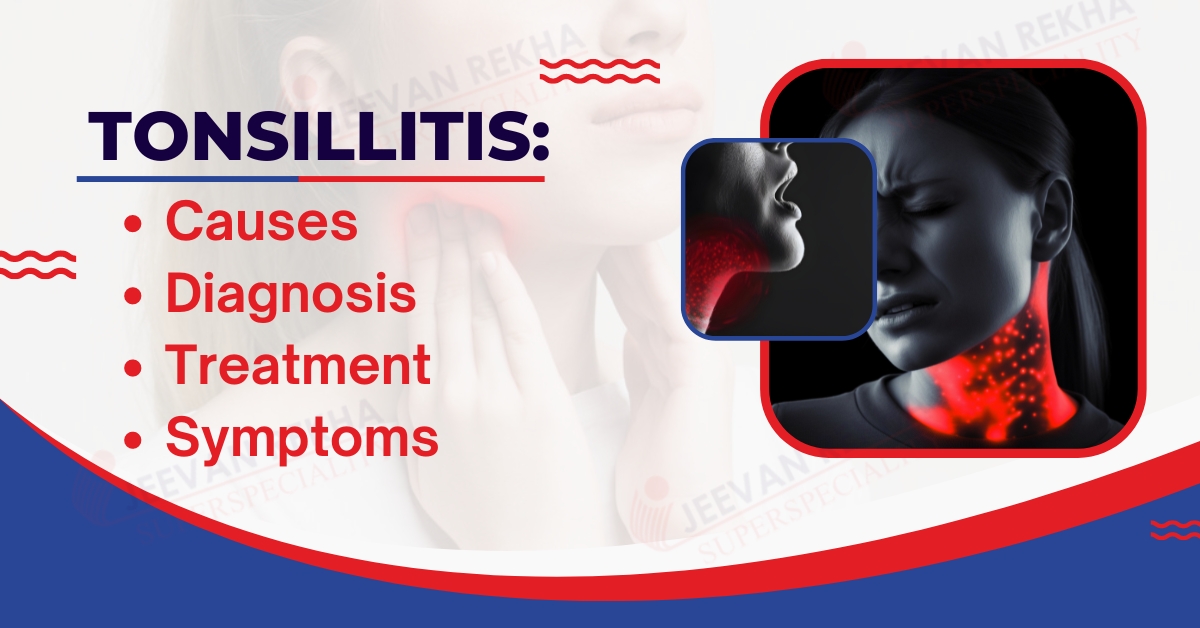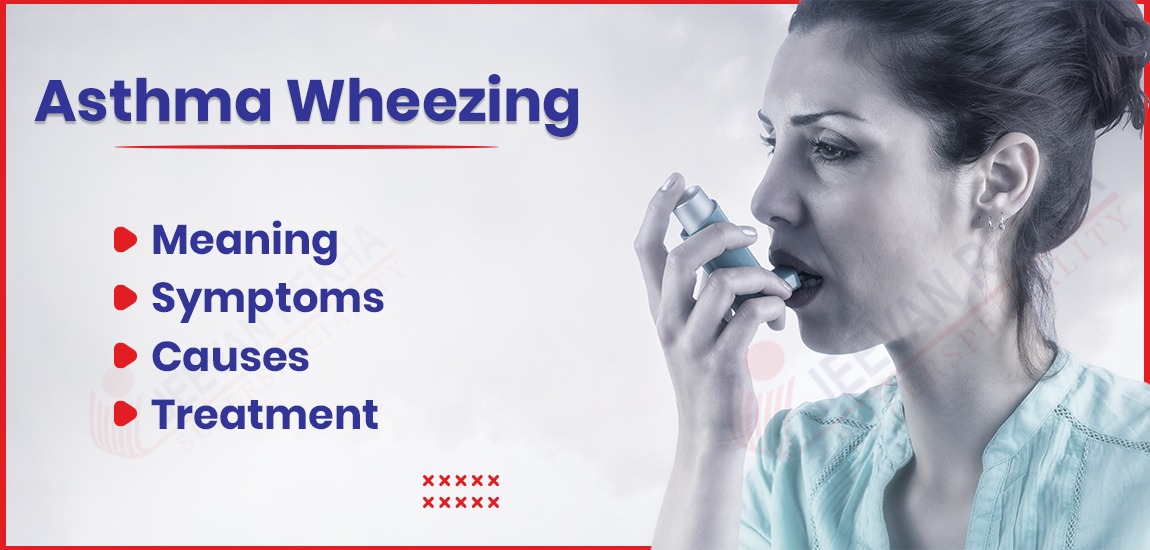
- By admin
- In Health and Tips,
- Posted August 21, 2024
Tonsillitis: Symptoms, Causes, Treatment & Diagnosis
What is Tonsillitis?
Tonsillitis is an inflammation of the tonsils, which are two oval-shaped lymph nodes located at the back of the throat. This condition can be caused by viral or bacterial infections and is characterized by symptoms such as a sore throat, difficulty swallowing, swollen tonsils, and fever.
In some instances, the tonsils may present with white or yellow spots. Tonsillitis is more common in children but can affect individuals of all ages.
Treatment depends on the underlying cause; viral tonsillitis typically resolves on its own with supportive care, while bacterial tonsillitis may require antibiotics. In recurrent or severe cases, surgical removal of the tonsils, known as a tonsillectomy, might be considered.
Symptoms of Tonsillitis
The symptoms of tonsillitis can vary depending on whether the cause is viral or bacterial, but common signs include:
- Sore Throat: A persistent and often severe sore throat is one of the hallmark symptoms.
- Swollen Tonsils: The tonsils may appear red, swollen, and enlarged.
- White or Yellow Patches: Pus-filled spots or a coating on the tonsils can be present, especially in bacterial infections.
- Difficulty Swallowing: Pain or discomfort while swallowing food or beverages.
- Fever: Elevated body temperature is common, often accompanying chills.
- Ear Pain: Sometimes, the pain from tonsillitis can radiate to the ears.
- Headache: Generalized headache may accompany the sore throat.
- Swollen Lymph Nodes: Enlarged lymph nodes in the neck can be felt when palpated.
- Fatigue: Feeling unusually tired or weak.
Causes of Tonsillitis
Tonsillitis is primarily caused by infections, which can be viral or bacterial. Here are the main causes:
- Viral Infections: The most common cause of tonsillitis is a viral infection. Viruses such as those responsible for the common cold (rhinoviruses), influenza (flu), and Epstein-Barr virus (which causes mononucleosis) can lead to tonsillitis.
- Bacterial Infections: Streptococcus bacteria, particularly Group A Streptococcus, is a leading cause of bacterial tonsillitis, commonly referred to as strep throat. Other bacterial infections that can cause tonsillitis include those from Staphylococcus bacteria and, less commonly, Corynebacterium diphtheriae (which causes diphtheria).
- Fungal Infections: Though less common, fungal infections, such as those caused by Candida species, can occasionally lead to tonsillitis, particularly in individuals with weakened immune systems.
- Allergies: Allergic reactions to substances such as pollen, dust, or other allergens can sometimes cause inflammation of the tonsils, though this is less common compared to infections.
- Irritants: Exposure to irritants like tobacco smoke or pollution can contribute to tonsil inflammation or exacerbate existing symptoms.
- Chronic Conditions: Conditions that compromise the immune system or cause chronic inflammation, such as autoimmune diseases, can also increase the risk of developing tonsillitis.
Risk Factors of Tonsillitis
The risk factors for tonsillitis include:
- Age: Children and young adults are more susceptible.
- Frequent Infections: Recurrent upper respiratory infections can increase risk.
- Weakened Immune System: Conditions or treatments that impair immune function make individuals more vulnerable.
- Exposure to Infected Individuals: Close contact with someone who has tonsillitis can lead to infection.
- Seasonal Factors: Tonsillitis is more common during colder months when respiratory infections are prevalent.
- Environmental Irritants: Exposure to tobacco smoke and pollution can contribute to inflammation.
Complications of Tonsillitis
Complications of tonsillitis can include:
- Peritonsillar Abscess: A painful collection of pus near the tonsil that can cause severe throat pain and difficulty swallowing.
- Spread of Infection: Infection can spread to nearby tissues or other parts of the body, including the ears, sinuses, or even the bloodstream.
- Obstructive Sleep Apnea: Enlarged tonsils can obstruct the airway during sleep, resulting in breathing difficulties.
- Rheumatic Fever: A rare but serious complication of untreated streptococcal tonsillitis, affecting the heart, joints, and skin.
- Kidney Infections: In some cases, streptococcal infections may lead to kidney complications.
You can read also:- Difference Between Heart Failure and Heart Attack
Treatment of Tonsillitis
The treatment for tonsillitis depends on the underlying cause, which can be viral or bacterial:
1. Viral Tonsillitis:
- Supportive Care: Focuses on relieving symptoms. This includes rest, plenty of fluids, and over-the-counter pain relievers such as ibuprofen or acetaminophen to reduce pain and fever.
- Gargling: Saltwater gargles can help soothe the throat.
- Humidification: Using a humidifier or taking steamy showers can ease throat discomfort.
2. Bacterial Tonsillitis:
- Antibiotics: Prescribed to treat bacterial infections, especially if caused by Group A Streptococcus. It is crucial to complete the full course of antibiotics as prescribed to prevent complications and reduce the risk of spreading the infection.
- Pain Relief: Over-the-counter medications may be used in conjunction with antibiotics to manage symptoms.
3. Severe or Recurrent Tonsillitis:
- Surgery: Tonsillectomy, the surgical removal of the tonsils, may be recommended for individuals with frequent or severe episodes of tonsillitis that do not respond to other treatments.
4. Home Remedies:
- Hydration: Drinking plenty of fluids helps keep the throat moist and aids in recovery.
- Soft Foods: Eating soft, bland foods can minimize discomfort while swallowing.
Diagnosis of Tonsillitis
Diagnosing tonsillitis involves several steps to determine the cause and appropriate treatment:
- Medical History: The healthcare provider will review the patient’s symptoms, medical history, and any recent exposure to infectious agents.
- Physical Examination: The provider will examine the throat to check for swollen, red tonsils and any white or yellow patches. They may also palpate the neck to assess for swollen lymph nodes.
- Throat Culture: A swab from the throat is taken to test for the presence of Group A Streptococcus bacteria, which causes strep throat. This helps determine if a bacterial infection is present.
- Rapid Antigen Test: This test detects specific antigens related to streptococcal bacteria in a quick manner and is often used alongside or instead of a throat culture.
- Blood Tests: In some cases, blood tests might be conducted to check for signs of infection or to identify other possible causes, such as a viral infection.
- Imaging: Rarely, imaging studies like a throat ultrasound or X-ray may be used to check for complications like a peritonsillar abscess.
You can also read:- Hiatal Hernia: Symptoms, Causes, Diagnosis and Treatment
Recovery of Tonsillitis
Recovery from tonsillitis typically depends on the underlying cause and the effectiveness of the treatment provided. Here’s a general overview of what to expect during the recovery process:
1. Viral Tonsillitis:
- Duration: Symptoms may improve within 7-10 days with supportive care.
- Care: Focus on rest, hydration, pain relief, and soothing remedies. Avoid strenuous activities and ensure adequate rest to speed up recovery.
2. Bacterial Tonsillitis:
- Duration: Improvement is generally seen within 24-48 hours of starting antibiotics, though the full course of medication should be completed (usually 10 days).
- Care: Along with antibiotics, continue using over-the-counter pain relievers and follow the same supportive measures as for viral tonsillitis.
3. Post-Treatment Care:
- Hydration: Continue to drink plenty of fluids to keep the throat moist and aid in healing.
- Diet: Eat soft, bland foods to avoid irritation.
- Follow-Up: If symptoms persist or worsen despite treatment, or if complications arise, consult a healthcare provider for further evaluation.
4. After Tonsillectomy (if surgery is performed):
- Initial Recovery: Pain and discomfort can last for about 1-2 weeks, with most people returning to normal activities in 2-3 weeks.
- Care: Follow post-surgical care instructions, including pain management, maintaining hydration, and avoiding hard or spicy foods.
Conclusion
At Jeevan Rekha Hospital, Jaipur, we prioritize comprehensive care for patients with tonsillitis, ensuring accurate diagnosis and effective treatment tailored to each individual’s needs.
Our approach combines advanced medical diagnostics, personalized treatment plans, and compassionate support to promote swift recovery and minimize complications. Whether addressing viral or bacterial infections, or managing more severe cases with surgical intervention, our dedicated team of healthcare professionals is committed to delivering the highest standard of care.
For any concerns regarding tonsillitis or related conditions, our experts are here to provide guidance and treatment, fostering a path to optimal health and well-being.
Tags
Blog Search
Latest Posts
-
बर्ड फ्लू के लक्षण, कारण, उपचार और बचाव के उपाय जानें
December 04, 2025 -
Best Diet Plan for Menopause Weight Management
November 25, 2025 -
Pulmonary Fibrosis Treatment: Understanding Lung Scarring and Breathing Problems
November 21, 2025 -
Arrhythmia: Types, Causes, Symptoms, and Treatment
November 07, 2025 -
Silent Heart Attack: Causes, Symptoms and Treatment
October 24, 2025




